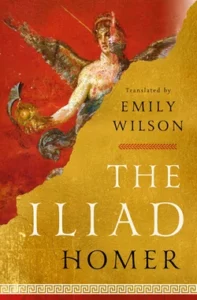I’m a sucker for the end-of-year recommendations you see in Nov-Dec issues of book, music, film magazines and websites. Reading them costs me a bit of money I don’t need to spend given what already lies close to hand. But I promise the costs of what I recommend will be small while the pleasures great.
Let’s start with the brilliant new translation of Homer’s The Iliad by Emily Wilson. I’m not saying it’s the best but that it deserves to stand beside those of Lattimore, Mandelbaum, Eagles, and Fitzgerald.

Here’s an example of a translation that distinguishes itself in both ease of reading and depiction of heroic action. From Book 14 of the poem, when the Greek and Trojan armies clash on the battlefield exhorted by Poseidon and Hector:
The sea surged up towards the huts and ships.
The armies clashed with a tumultuous cry.
Louder than roaring of the waves on the shore,
when cruel blasts of Boreas have stirred
the deepest water, louder than the rumble
of blazing fire that leaps to burn a forest
within the thickets on the mountainside,
louder than wind that shrieks through lofty oak trees,
which roars the loudest when it rages most—
louder than all of these, the Greeks and Trojans
let out their terrifying screams and cries
as they attacked each other.
Next, I want you to know about a new, landmark recording of the musical ‘Oklahoma’ (1943) by Richard Rodgers and Oscar Hammerstein II. The conductor John Wilson has risen to prominence beginning with the vitality of his Proms appearances and series of recordings by his Sinfonia of London on Chandos. His recordings of Korngold’s Violin Concerto and the Symphony in F Sharp are superb. His ‘Oklahoma’ is the first complete recording of all the musical material created by the composer and lyricist. Rodgers wrote melodies that will last until the Apocalypse and, perhaps, beyond. Hammerstein could make you laugh, smile, and cry, always revealing the hearts of his characters and the adventure of love.

Too often re-recordings of classic musicals make the mistake of employing poor or inappropriate voices, but Wilson knows where to find the good singers and matches them perfectly to the main characters of Curly, Laurie, Will, Addo Annie, and Jud. As I listened to this recording, I did not miss the sound of Alfred Drake, Gordon McRae, or any of the stars of the original recording or the 1955 film.
Writing about great films of 2023 may be a bit premature given the upcoming premiere of Napoleon directed by Ridley Scott starring Joaquin Phoenix, but this is the favorite of those I have seen thus far. The Holdovers is a tiny movie compared to the grandeur of Oppenheimer, my second favorite film of the year. But The Holdovers explores relationships central to all our lives: parents and children, teachers and students, and those persons we work with, side-by-side.

Paul Giamatti plays Paul Hunham, a teacher of Latin and Greek at a boarding school in New England. He attended the school, came back to teach, and has been there so many years one of his students is now the Dean. None of the students care for classics or him personally — we see in the opening scene that the student’s hostility is palpable.
Dominic Tessa plays Angus Tully, a smart student whose mother calls to tell him not to come home for Christmas. She and her new husband need their time together and so forth. He joins a small group of students who are stuck at school over the Christmas holiday being supervised and taught by Hunham. Da”Vine Joy Randolph plays the school cook, Mary Lamb, in what seems a minor role but becomes central to dealing with the Hunham’s self-disgust and Tully’s anger.
The film turns into a journey beyond the walls of the boarding school to Boston where Hunham takes Tully to visit his biological father who has been in a mental hospital for years while being divorced by his wife, Tully’s mother. At this point, two characters trapped in their own sorrow begin to soften and a marvelous but modest transformation takes place.
I hope you enjoy these if you find the time. Happy Thanksgiving!














